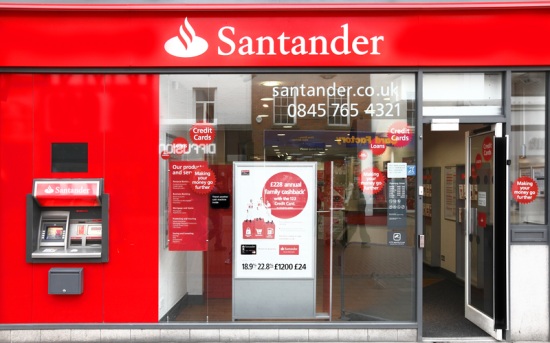Small commercial property businesses in the UK are having a particularly tough time at the moment. Between the lowering of the average family’s disposable income as a result of the double dip recession and issues in trans-European trading, including the import and export of goods, due to the Eurozone crisis which has thrown much of southern Europe into a financial black hole, revenues continue to decrease for the majority of British businesses. This even includes chains such as Blacks Leisure, Aquascutum and the GAME group, all of which have been forced into selling their commercial property brands or even liquidating their assets completely over the past twelve months.

Unfortunately, the news on the finance front continues to be bleak, especially for commercial property companies who hold business accounts with Santander.
The banking chain have announced this week that their “free” business accounts will no longer be available from later in the year. This will affect existing customers who will no longer be able to reap the benefits of a free business account, as Santander have declared the initiative financially unviable and as such have introduced a fee for all commercial property companies banking with them.
Despite thousands of these small companies being drawn into the scheme when it was first launched, largely due to the “free forever” marketing campaign, they have been informed that their business accounts will now cost £7.50 per month. This totals an annual charge of £90, which may seem like a small amount – but given how close many small UK commercial properties are currently near to the waterline in the financial sense, could prove to be the straw that broke the camel’s back for many.
Santander claim that the charges are necessary in order for them to provide a better service, and that the £20.7 million garnered from the accounts annually will allow them to increase the interest rate. However, this may be of little consequence to many small companies relying on the free service to remain afloat. New start-up businesses will still have the option of opening a free business account, but in all likelihood this will only be an option for the first year of trading before the commercial property company will have to upgrade to a more costly account.
A spokesman for Santander said; “Our business customers have told us that they require more.
“The majority of our customers will see that this account is highly competitive and gives them the all round service they demand so that they can concentrate on growing their businesses.”
As a result of the monthly fee, Santander claim that they will have the finances to increase the number of business managers in commercial property branches across the country, thus providing a more efficient service for their customers. Additionally, they plan to increase the interest rate to 0.25 per cent on balances held in companies’ business accounts.
It is estimated that around 230,000 commercial property businesses will be affected by the changes to the business current accounts, largely consisting of customers who transferred to the banking chain after its takeover of both the Abbey and Alliance and Leicester.
Yet these small firms may still have a chance to fight the changes to their accounts, as both the Financial Services Authority (FSA) and the Financial Ombudsman Service (FOS) are both investigating the matter further. They advise customers to register a complaint with Santander in the first instance, and to seek an answer to their query within eight weeks as is required by law.
Additionally, the Federation of Small Businesses (FSB) will be taking steps to protect their members from financial hardships as a result of Santander’s decision. Pierre Williams told the BBC earlier this week that the FSB is currently examining the case in order to determine whether Santander, in reneging upon its promise of “free forever” accounts, is in breach of contracts signed with thousands of small UK commercial property businesses.
He continued; “Santander launched this ‘free business banking for life’ to a big fanfare and as a skilled marketing stunt.
“The announcement that they have withdrawn these accounts will come as a severe disappointment to the businesses that joined the bank on the strength of this promise.”
Yet it appears that Santander are not alone in claiming that free bank accounts are unsustainable, not only to the commercial property banking chains offering them, but to the economy as well. Earlier this week, chairman of the FSA Lord Turner stated that all personal bank accounts should come with automatic charges, even if customers are in credit. In not putting into place these charges, commercial property banks were being led into miss-selling and decreasing the competition within the high street banking sector.
He said; “We need to recognise a central problem in UK retail banking – the impact on competition of ‘free if in credit’ banking.”
Do you think that Santander should honour its promise to businesses who chose to bank with them as a result of the “free for life” marketing campaign? Or do you agree with Lord Turner and think that greater economic stimulation will only come about as a result of blanket fees upon all customers of UK commercial property banks?